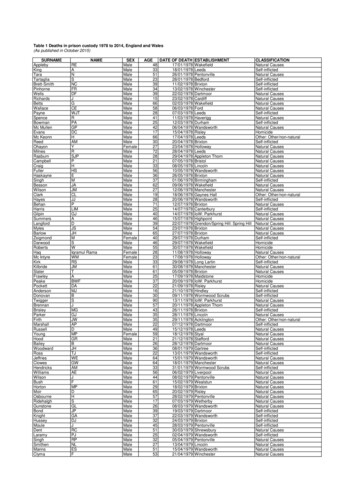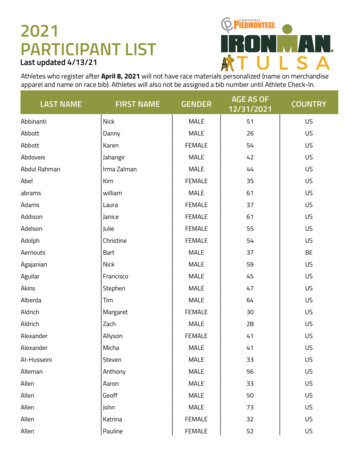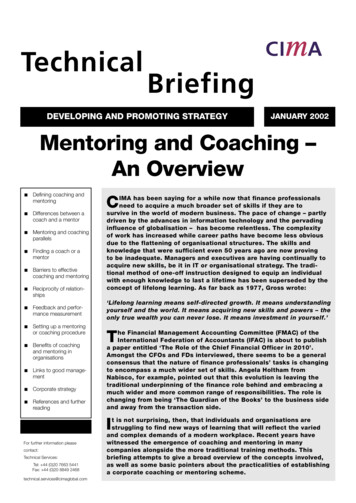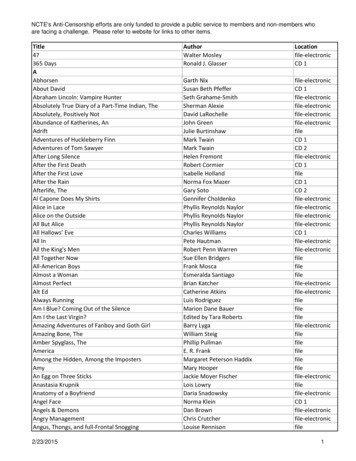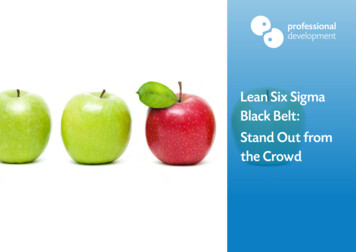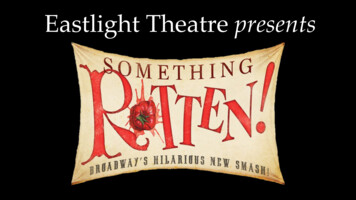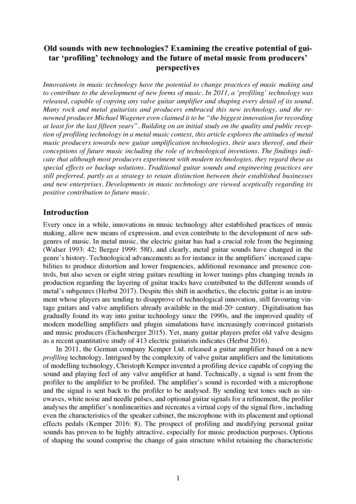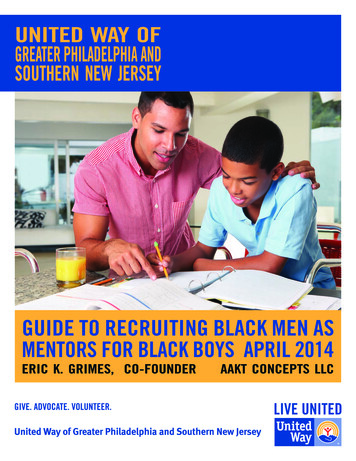
Transcription
UNITED WAY OFGREATER PHILADELPHIA ANDSOUTHERN NEW JERSEYGUIDE TO RECRUITING BLACK MEN ASMENTORS FOR BLACK BOYS APRIL 2014ERIC K. GRIMES, CO-FOUNDERAAKT CONCEPTS LLC
Table of ContentsABOUT UNITED WAY OF GREATER PHILADELPHIA AND SOUTHERN NEW JERSEY . 3Overview of United Way’s Greater Philadelphia Mentoring Partnership. 3ABOUT AAKT CONCEPTS LLC . 4Introduction . 5Context. 5CALL TO ACTION. 6SECTION 1 – Program Readiness . 7Healthy Adulthood, Educational Success and Black Males . 7Mentoring Makes A Difference . 8 Race and Gender Matter! . 9FINDING THE RIGHT FIT FOR BLACK BOYS AND MEN . 10Assessment Tool 1:‘Is This Work For You?’ Readiness to Engage Report Card . 11SECTION 2 – Black MENtoring Social Marketing Campaign: A Guide For The Field. 13A Social Marketing Approach . 14Social Marketing and the Black MENtoring Campaign . 15TO WHOM TO SAY IT * . 16Case Study Part 1 – (Census 2010): It’s In Our Hands. 16WHAT TO SAY . 18Case Study Part 2 – (Census 2010): It’s In Our Hands. 18Table: Matching Value Function Inventory, Key Messages and Retention Activities. 22You Talkin’ To Me?’: Black MENtoring Message Resonance Report Card . 23WHO SHOULD SAY IT . 24Discovery and Action Dialogue Worksheet . 26WHERE TO SAY IT . 27PUTTING IT ALL TOGETHER . 29Program Tool 1: Black MENtoring Program Outreach, Recruitment and RetentionConsideration Checklist. 30Conclusion . 31Endnotes . 32References . 34
ABOUT UNITED WAY OF GREATERPHILADELPHIA AND SOUTHERN NEW JERSEYUnited Way of Greater Philadelphia and Southern New Jersey’s mission is to harness, leverage and strategicallyinvest the collective power of donors, advocates and volunteers, to drive measurable results that improve thelives of people in our region.United Way of Greater Philadelphia and Southern New Jersey is the one organization with the ability to bringthe business community, organized labor, public and non-profit sectors together to identify critical needsacross our region and collectively address complex issues to drive real, measurable, systemic change thatensures children succeed in school, families are financially stable and all community members have theirhealth and basic needs met. United Way’s expertise is in uniting, problem solving and driving collective actionto amplify the power of the individual and achieve what no one person can achieve alone.Overview of United Way’s Greater Philadelphia Mentoring PartnershipUnited Way’s Greater Philadelphia Mentoring Partnership (GPMP) is elevating mentoring practices throughoutthe region to ensure access for children and youth to caring and supportive mentors. Our mission is to foster amentor-rich environment and a culture of high-quality mentoring and mentor-related volunteering. GPMP hasthree goals:1. To ensure that mentoring and related volunteer programs meet best practice guidelines12. To prepare adults and youth to develop meaningful relationships3. To develop and support mentoring and related volunteer models that address the needs of underservedyouth, particularly those with Early Warning Indicators2 for school drop-outOur Focus on Mentoring and Black Male Achievement:United Way of Greater Philadelphia and Southern New Jersey (UWGPSNJ) has served as the regional affiliateof MENTOR./The National Mentoring Partnership since 1989, and in that capacity has served as a resourcefor mentors and more than 85 mentoring programs throughout the southeastern PA region. UWGPSNJ hasbeen concerned with the issues of recruiting African-American men as mentors to improve the outcomes ofyoung men of color since 2006 as a result of the Mentoring Providers Network sharing that two of their biggestchallenges are: 1) effective engagement and retention of Black male teenagers age 12 and above, and 2)recruiting African-American men as mentors to work with Black males in their programs.3
ABOUT AAKT CONCEPTS LLCEric K. Grimes, Co-Founder & PresidentAAKT (pronounced Act) Concepts stands for Action, Advocacy, Knowledge, and Training Concepts. Our signatureinitiative, Reaching Out For The Brothers: Concepts * Ideas * Strategies for the Effective Development of BlackMen and Boys, is a comprehensive initiative that engages in action, advocacy, knowledge development andtraining to authentically and accurately articulate Black male experiences in an effort to empower young Blackmen and boys, as well as those who work with or on behalf of them.Services Include: Concept and Idea Development, Enhancement and Amplification Strategies Professional Development and Staff Training Group Facilitation, Seminars and Workshops Program Development and Management Organizational Capacity Building and Technical Assistance Curriculum, Toolkit, Guidebook, Documentation and Virtual Interactive Platform DevelopmentSelect Projects and Activities: Program Development Consultant – provide consultation and assistance to program staff andmanagement of federally-funded REXO re-entry services for ex-offenders and program service delivery tomale youth, ages 16 – 19, in an afterschool program designed to help them avoid truancy and achieveacademic goals. Technical Assistance Consultant – Technical assistance provider, workshop presenter and guidebookauthor for organizations endeavoring to establish or enhance mentoring programs targeting males ofcolor. On Air Radio Host, WURD 900AM – Weekly co-host of ‘Wake Up With WURD’ drive time morning program(Wednesdays) on Pennsylvania’s only African American owned talk radio station. Lecturer/Instructor, Psycho-educational Interactions with Black Males – created course taught at theUniversity of Pennsylvania Graduate School of Education (since Fall 2007) designed to prepare futureand current educators, counselors, social workers and other professionals to better serve and empowerthe young Black males they will engage. Facilitator, Non-Profit Institute – Technical assistance provider and workshop presenter for variousseminars and institutes sponsored by the University of Pennsylvania’s Netter Center for CommunityEngagement regarding non-profit administration and management.Select Affiliations: Chair, Education Committee – Mayor’s Commission for African American Males (Philadelphia) Member, Advisory Network (Planning Phase) – Open Society Black Male Achievement Leadership andSustainability Institute Member, Steering Committee – United Way of Greater Philadelphia and Southern New Jersey’s PhillyRoots Initiative Founding Member and Convener, Steering Committee – Black CAPs Philly Initiative4
GUIDE TO RECRUITING BLACK MENAS MENTORS FOR BLACK BOYSIntroductionThe difficulties faced by black male youth in their quest foreducational success are well documented. Black men are uniquelypositioned to help guide these youth to educational success anda productive future and through the barriers that stand in theirway. But there are almost always more black boys to be mentoredthan black men to mentor them in formal mentoring programs.This guide will help mentoring programs engage in a productiveand inclusive recruitment campaign by doing the following: Addressing program readiness – Section One discussesthe key idea of serving black male youth in a mentoringprogram that acknowledges and addresses the black maleyouth experience in a culturally relevant way. It also reviewsthe practice implications of such a program – black men aremore willing to be engaged and retained in programs thatare speaking to the black male experience, however varied,and black male youth are more successful. This section asksprograms to assess whether they are ready to address theblack male experience in their mentoring program. Providing guidance on an effective social marketing campaign – Section Two will detail the who, what, towhom, and where to implement an effective social marketing campaign to recruit black men to mentor.Practice tools and case studies are provided for programs to learn apply these strategies.ContextRecruiting enthusiastic and appropriate adults as mentors is an important component of a successful mentoringprogram. Developing a clear mentoring model and instituting an effective social marketing campaign are keysto this and we intend for this guide to provide program developers with ways to engage African American mento make a difference for our communities.Whether natural or formal,3 a mentor can greatly impact the lives of young people from all walks of life: Formal mentoring is a structured and trusting relationship that brings young people together with caringindividuals who offer guidance, support and encouragement aimed at developing the competence andcharacter of the mentee (MENTOR, 2005). Informal/Natural mentoring consists of a relationship with an older friend, relative, community member,or colleague that provides encouragement and support. This mentoring relationship occurs when thereis a deliberate intent to develop, grow or impart wisdom through conversation and need not exist in aformal setting.But while a growing number of youth have mentors, there are more ‘unmatched’ youth who could benefit fromhaving a mentoring relationship. This unmet need constitutes the mentoring gap and recruiting Black men toserve as mentors to Black boys is a challenging, but worthwhile effort.5
CALL TO ACTIONYou: A Guide TO & THROUGH for Black BoysAll youth deserve a clear path to healthy adulthood, as well as formal and natural supports to help them getthrough the obstacles and challenges faced as they follow this path! But on the road to healthy adulthood,many Black boys and young men are subjected to three major shortcomings in their development andsocialization:1. Socialization into Insignificance – ineffective training and preparation of young males regarding theexpected traits, attitudes and behaviors of positive Black manhood relative to their cultural experiencesand community needs.2. Limited Connections, Access and Networks – inadequate access to sufficient adult male role modelsafter whom to pattern behaviors, and to the social and opportunity networks that aid success.3. Improper and Insufficient Tools, Skills and Abilities – ineffective skill development and educationalpreparation which limits their ability to deal with the particular societal and personal issues they face,and those faced by the communities in which they reside.The good news is that there are organizations and individuals positioned to help Black boys overcomemany of the obstacles to educational, social and career success and willing to provide support. Throughwell developed and strategic interactions and engagements, these individuals and organizations can: help Black boys create and develop a healthy identity build up their belief in themselves and those around them to believe they can make it facilitate the skill development and social connections needed for them to make itBut are they ready? In order to do this, Black boys need to connect with concerned adults and mentors whocan help them chart a powerful course into the future and navigate through the challenges and obstaclesin their way.Providing guidance ‘to’ and ‘through’ for Black boys is a collective responsibility requiring collective work,especially for youth in socially, economically and racially marginalized communities.4 A qualified andequipped mentor could help guide a Black boy ‘to’ and ‘through’ on the journey to healthy adulthood andyes, we’re talking to you!This guide is designed to assist your organization in developing and implementing an outreach, recruitmentand retention strategy that speaks to Black men who would serve as mentors to Black boys. Thoughovercoming the mentoring gap and recruiting men to serve as mentors to boys has been deemed anoverwhelming challenge, this guide will offer a framework and suggestions on how programs can effectivelyrecruit, recognize and retain mentors. It will specifically focus on this challenge from the perspective of thedemographic of greatest need – recruiting Black men to mentor Black boys.In it we propose the Black MENtoring Social Marketing Campaign whereby we: Offer a mentoring model that speaks to the specific needs of Black boys and adolescents, with aparticular focus on academic and educational success Identify/Utilize effective social marketing elements of prior campaigns that had success targeting Blackmen Apply the concept of Positive Deviance as a basis for designing a campaign to recruit Black men asmentors for Black BoysWhether formal or informal, mentoring is great opportunity and this guide is another tool for helping yourorganization and program assist Black men and boys to realize its full benefit.6
SECTION 1 – Program ReadinessHealthy Adulthood, Educational Success and Black MalesThough all youth are deserving, far too many black boysand young men face significant challenges attaining theoutcomes desired and supports needed on the path tobecoming a healthy adult. Additionally, current ineffectivesocialization and education processes “prepare” Black maleyouth for systematic disconnection from basic life milestoneslike high school graduation, post-secondary education andemployment.School readiness and early success serve as springboardsupon which future academic and career achievement mayrely. However, only 51% of poor children (3-to-5-years old) areenrolled in organized child care or an early education program.5Considering that low-income families are disproportionatelyBlack and Brown, it doesn’t bode well for the developmentof young Black boys who already face a school readinessgap before one can even consider an academic achievementgap. Additionally, African-American boys are over 4½ timesmore likely to be expelled from Pre-K programs. Thus, Blackmales are underserved and disproportionately removed fromcritical early childhood educational programming.As Black boys move further along the “educational” pipeline, in an era of high stakes testing, they are beingfurther left behind. The high pressure for many schools to make Annual Yearly Progress has led to educationalapproaches that further marginalize black males in the education system6: Over the past decade the reading scores of black males in the 4th, 8th, and 12th grade have increasedby 8%, but are still considerably lower compared to their white, Latino and Asian peers. In 4th, 8th and12th grades, Black males without disabilities had lower reading scores and grade proficiency than WhiteMales with disabilities. Zero tolerance discipline policies that facilitate how urban school systems enforce punitive consequencesfor simple misconduct disproportionately impact students of color, particularly Black boys. These schoolpolicies and/or practices make them inherently vulnerable and susceptible to arrest, probation, or otherforms of juvenile custody. In school systems, this is institutionalized by the overrepresentation of youngBlack male students in suspension and expulsion rates: African Americans comprise only 17% of public schools but constitute 34% of out of school suspensionsand are 4 times more likely to reported to police by school officials In urban areas like NYC, Chicago and Philadelphia, Latino and African-Americans constituted almost98% of public school arrests, with males accounting for the majority of those arrested in each group Only 52% of Black males graduated from high school in 2010, but locally (Philadelphia) that number wasonly 24%, as reported by the Schott Foundation.For those young men who are unable to navigate the educational pipeline and end up in the punitive juvenileand criminal justice systems, the challenges and barriers are even more significant. And if a young Black boyis able to successfully navigate this reality and make it to graduation, post-secondary educational readiness,access, and retention present a set of unique challenges as well. Unfortunately, this population experiencessome of the greatest barriers to college matriculation and degree completion.7
According to the work of Dr. Shaun Harper7: Black male students are often comparatively less prepared than are others for the rigors of college levelacademic work Black male college completion rates are lowest among all racial/ethnic groups in U.S. higher education Black men’s degree attainment across all levels of postsecondary education is alarmingly low, especiallyin comparison to their same-race female counterpartsWhile the statistics paint a daunting picture, proper interventions and supports like mentoring that addressthe early warning indicators and facilitate effective transitions throughout a child’s educational career canhelp Black males navigate through these obstacles.Mentoring Makes A Difference Research distinguishes two types of mentoring relationships: instrumental and psychosocial8: Instrumental mentoring relationships are problem focused and tend to help individuals reach particulargoals Psychosocial mentoring relationships are process oriented and focus on modifying the personal qualitiesof the protégéPositive youth development outcomes associated with mentoringinclude gains in self-esteem and self- confidence, increases inacademic achievement, reduced likelihood of initiating drug useand lower rates of recidivism among juvenile delinquents9. Evenfor youth displaying higher levels of risk factors, quality mentoringrelationships helped them do significantly better than youth inthe non-mentored comparison group on a number of importantoutcome measures.When young people are mentored well: 98% stay in school 98% do not become teen parents 85% don’t use drugsA recent study of mentoring’s effect on higher risk youth suggests 98% avoid gang participationthat those youth in quality matches reported fewer depressive National CARES Mentoring Movementsymptoms, greater acceptance by their peers, more positivebeliefs about their ability to succeed in school, and better gradesin school.10 Important to the successful matches were effective early match training and consistent supportfor mentors, which facilitated more frequent, higher quality and longer-lasting relationships with mentees.The key messages of the report were twofold: Mentoring programs can be beneficial for youth with a broad range of backgrounds and characteristics,and Tailoring mentor training and supports based on the specific risks youth face has the potential to produceeven stronger benefits.It is becoming clear that effective mentoring matters! But it is also important to understand how gender, race,class and ethnicity issues might influence the mentoring relationship since ineffective mentoring can havesignificant impacts on youth outcomes.8
Race and Gender Matter!Mentoring’s Difference Maker:Sustained, Quality RelationshipsRhodes and Grossman examined whether theeffects of mentoring relationships varied as afunction of their duration. Youth in matchesthat terminated within six months sufferedlarger drops in feelings of self-worth andperceived scholastic competence than youthin the study who had never been matchedwith a mentor. Youth in matches that lasted 12months or more reported significantly higherlevels of self-worth, social acceptance andscholastic competence. They also reportedthat their relationships with their parents hadimproved, school had become more rewardingand their drug and alcohol use had declined.Grossman and Rhodes, 2002.Since negative and ineffective mentoring is not harmlessand negative mentoring experiences can have negativeeffects on the youth mentored, mentor recruitment,matching and relationship quality are essential. Youthwho were in relationships that lasted a year or longerreported improvements in academic, psychosocial, andbehavioral outcomes; youth who were in relationships thatterminated within 3 months reported drops in self-worthand perceived scholastic competence11.Mentoring authority Jean Rhodes notes that, in general,girls want mentors who talk with them (psychosocial),whereas boys want mentors who engage in activities withthem (instrumental). Thus, when mentoring programsfocus on instrumental mentoring, males may derive morebenefit than females. When mentoring programs focus onpsychosocial mentoring, females might benefit more.In one study, when gender was taken into account, greaterbenefits for same-race matches were found - compared toboys in cross race matches, boys in same race matcheswere more likely to demonstrate increases in academic competence and self-esteem; girls in same racematches compared to girls in cross-race matches were more likely to show increases in schools value andself-esteem12. Race and ethnicity are also critical factors in mentoring relationships : Because youth differ in the perceived salience oftheir ethnic/racial identities, they may have differentexperiences with mentors from the same or differentethnic backgrounds. In looking at the natural and formalmentoring relationships of late adolescents and collegeaged ethnic minorities, cultural differences seem to playa role in the expectations, attainment and experienceof mentoring. When youth choose their own mentors,they tend to seek people of the same race or ethnicbackgrounds. 35% of African Americans report that theyengage in some form of volunteerism,averaging about 4.5 hours per week It is possible that youth and families who valuecollectivism are better served by mentoring programsthat foster relationships of the child and the variousadults in his life, the mentor and the child within thefamily, or between the mentor and the family as a whole. African-American men are less involvedthan their female counterparts involunteerism. Cultural mistrust may negatively affect mentoringrelationships, especially in their early stages, whengroup stereotypes are more prevalent. Because ofcultural mistrust, minority youth in academic contextsmay be less likely to seek out white mentors.A Look at Volunteerism and Mentoringfor African Americans: Though the level of Black volunteerismis low overall, Blacks who volunteer aremore engaged in mentoring than othergroups of volunteers. Though males are less likely to volunteerthan females, males and females mentorat similar rates. A substantial amount of mentoringhappens through religious affiliationsMENTOR and the Corporation forNational and Community Service9
FINDING THE RIGHT FIT FOR BLACK BOYS AND MENAs seen, there are interpersonal, community and societal level challenges that make the acquisition of basicyouth development outcomes and educational success more challenging for Black boys, making it necessaryfor them to employ an additional, uniquely defined set of skills and assets just to make it in society. It isthis set of unique circumstances and challenges Black boys endure, many of them coalescing around issuesencountered within education and schooling environments, beginning early in the developmental cycle,that calls out for why Black boys need critical and effective mentorship delivered to them by programs andindividuals able to guide them through these transitions and barriers. Yet, one of the key shortcomings inmany initiatives designed to work with Black males is the presumption that a general or universal modelapplies to the specific needs and challenges facing them.Many mentoring and youth development programs are not adequately ready and equipped to engage Blackboys and offer the level of support necessary to make a real difference for them on the journey to healthyadulthood and educational success. Indeed, this inadequate fit is a possible reason behind some of the weakand mixed findings in the mentoring, academic achievement and youth development research, particularly forlow income, Black males.A proper corrective lens must be chosen, and from this perspective, core to effective work with Black boysfacing challenges due to their racial group membership (Black), gender (male), and/or class status (poor)is a willingness to engage this reality and to utilize frameworks that identify and addresses the challengesassociated with this reality, not ones that ignore them.The Integrative Model of Developmental Competencies in Minority Children (IMDCMC)14 notes that issues atthe intersection of social class, culture, ethnicity and race matter for the development of minority childrenand must not be omitted from youth development conceptual models. Gender and age dynamics furthercomplicate these developmental models and are often not considered in conceptual frameworks. Socialposition (race, class, ethnicity, gender) and social stratification (i.e. racism, prejudice, discrimination,oppression, segregation, environmental factors, schooling, neighborhood, etc.) considerations must be atthe core of conceptual models, and not at the margins.As we expect youth to be school or program ready, programs and mentors must be ready to effectively engageBlack boys and young men, embracing the call to guide them ‘to’ and ‘through’. Mentoring programs thatignore this reality, and do not fully consider the needs of Black men and boys in their outreach, recruitment,matching and retention efforts may cause more harm than good for Black boys. Thus, before engaging in arecruitment and outreach campaign for Black men to serve as mentors for Black boys, it is important for yourorganization or program to (re)consider its mentoring approach. It is important to assess Its readiness to divedeep into the issues that impact this group and assess whether what it is prepared to offer fits the needsand addresses the realities Black boys and men face. The following assessment tool, ‘Is This Work For You?’Readiness to Engage Report Card, may be helpful to guide the assessment process.10
Assessment Tool 1:‘Is This Work For You?’Readiness to Engage Report Card15The publication Momentum: Sustaining Efforts to Improve Life Outcomes among African American Malesidentifies 5 attributes common in effective Black male work.Please have a representative number of stakeholders and staff members complete the assessment itemsbelow. At a later point, convene participants in a group session to discuss and provide an overall rating foryour organization/program and discuss ways to enhance your ratings moving forward.5 Attributes Essential toEffective Black Male WorkEngage Work through aRace Gender Lens:How close are you tohaving this attribute?1 to 5:1 “long way to go”5 “already there”EvidenceRating:Yes NoIn what ways is this evident in your program’s work?Rating:Yes NoIn what ways is this evident in your program’s work?A racial equity lens should be atthe fore while analyzing problems,looking for solutions, and definingsuccess. A Race Gender lens goesa step farther, realizing that Blackmales experience their lives asblack and male at the same time.Notes/Discussion:Acknowledge theInjustice of Unequal Raceand Gender Outcomes:Effective black males work isinformed by an analysis thatunderstands the poor outcomesblack males face in nearly everycategory of analysis and assertsthat such disparities are notcommensurate with a just andequitable society.Notes/Discussion:11
5 Attributes Essential toEffective Black Male WorkSeek to Address theInjustice of Raceand Gender Disparities:How close are you tohaving this attribute?1 to 5:1 “ long way to go”5 “already there”EvidenceR
6 CALL TO ACTION You: A Guide TO & THROUGH for Black Boys All youth deserve a clear path to healthy adulthood, as well as formal and natural supports to help them get through the obstacles and challenges faced as they follow this path! But on the road to healthy adulthood, many Black boys and young
